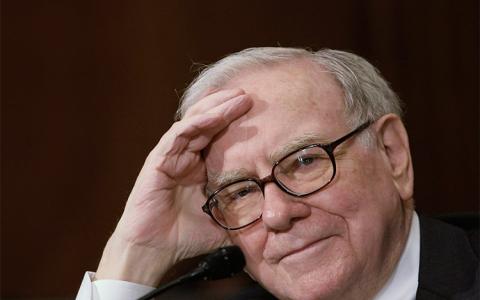
While Warren Buffett isn’t known to prognosticate on where interest rates are heading, he warns that fixed-income investors “face a bleak future."
“[B]onds are not the place to be these days,” Buffett wrote in his annual letter to Berkshire Hathaway (BRK-A, BRK-B) shareholders.
His warning comes amid a sharp rally in long-term interest rates that saw the 10-year Treasury yield (^TNX) recently touch its highest level in a year. Though it's worth noting interest rates have been trending lower for nearly 40 years.
“Can you believe that the income recently available from a 10-year U.S. Treasury bond – the yield was 0.93% at yearend – had fallen 94% from the 15.8% yield available in September 1981?" he wrote. "In certain large and important countries, such as Germany and Japan, investors earn a negative return on trillions of dollars of sovereign debt. Fixed-income investors worldwide – whether pension funds, insurance companies or retirees – face a bleak future."
Insurance represents the largest of Berkshire Hathaway's four "family jewel" businesses. Though unlike other insurance companies, Berkshire takes a more equity-heavy approach when investing its insurance float.
According to Buffett, Berkshire’s insurance fleet has more capital deployed than any of its competitors thanks to the financial strength of the operation and the “huge cash flow” generated by the non-insurance businesses.
This combination allows Berkshire’s insurance operation to “safely follow an equity-heavy investment strategy,” something that’s “not feasible for the overwhelming majority of insurers,” Buffett wrote. For regulatory and credit-rating reasons, a lot of insurers have to focus on bonds.
He noted that some insurers and bond investors “may try to juice the pathetic returns now available by shifting their purchases to obligations backed by shaky borrowers.” In other words, they may allocate more of the portfolios to financial instruments like leveraged loans and high-yield bonds, aka junk bonds.
“Risky loans, however, are not the answer to inadequate interest rates," he added. "Three decades ago, the once-mighty savings and loan industry destroyed itself, partly by ignoring that maxim."
According to the letter, Berkshire has $138 billion of insurance float. While noting that the funds don’t belong to Berkshire, they’re available to deploy in bonds, stocks or cash equivalents such as U.S. Treasury bills.
Always teaching others, he analogized the float to bank deposits with “cash flows in and out daily to insurers, with the total they hold changing very little.”
“The massive sum held by Berkshire is likely to remain near its present level for many years and, on a cumulative basis, has been costless to us," he wrote. "That happy result, of course, could change – but, over time, I like our odds."
This article originally appeared on Yahoo! Finance.



